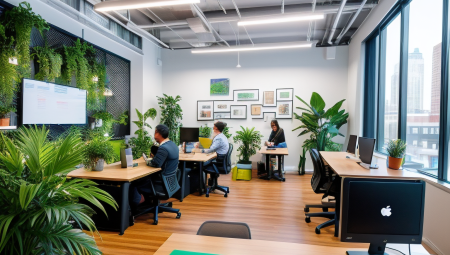As we venture deeper into the age of technology, many of us find ourselves asking, “Is my job at risk from AI?” The truth is, while artificial intelligence is transforming industries, certain careers remain steadfast, anchored by the unique qualities that only humans possess. Think about it: can a machine truly understand the intricacies of human emotion or the subtleties of creativity? The answer is a resounding no.
In this article, we will explore various professions that are less likely to be overshadowed by AI. From the compassionate hands of healthcare workers to the imaginative minds of artists, these roles thrive on empathy, creativity, and critical thinking. As we dissect these careers, it becomes evident that the human touch is irreplaceable. For instance, in healthcare, professionals are not just treating symptoms; they are connecting with patients on a profound level, something that AI simply cannot replicate.
Moreover, creative fields like writing and design flourish because they rely on personal experiences and emotional depth. Imagine a world where all art is generated by machines—would it resonate with our hearts the way a human’s touch does? Absolutely not! So, as we navigate through this technological revolution, let’s celebrate the careers that stand resilient against the tide of automation. After all, it’s not just about the tasks we perform; it’s about the human connection that we create.
Table of Contents
The Human Touch in Healthcare
In the ever-evolving landscape of healthcare, one thing remains crystal clear: human connection is irreplaceable. While technology advances and artificial intelligence (AI) becomes more integrated into medical practices, the essence of patient care relies heavily on empathy and emotional intelligence. Imagine walking into a hospital, feeling anxious and vulnerable; it’s the compassionate smile of a nurse or the reassuring words of a doctor that can make all the difference. This is something that AI simply cannot replicate.
Healthcare professionals are not just providers; they are caregivers, listeners, and advocates for their patients. Their ability to understand emotional cues and provide comfort is a skill that machines lack. For instance, when a patient receives bad news, it’s the human touch that helps them navigate their feelings and cope with the situation. This emotional intelligence is vital in building trust and rapport, which are essential for effective treatment.
Furthermore, the nuances of patient care often require a personal touch. Consider the following aspects:
- Empathy: Understanding a patient’s feelings and emotions.
- Communication: Effectively conveying information and listening to concerns.
- Support: Providing emotional and psychological support through difficult times.
In conclusion, while AI can assist with diagnostics and data management, the human touch in healthcare is what truly transforms the patient experience. As we embrace technological advancements, let’s not forget the irreplaceable value of human interaction in healing.
Creative Professions: Art and Design
In a world increasingly dominated by technology, the creative professions of art and design stand as a testament to the irreplaceable nature of human creativity. While machines can churn out patterns and replicate styles, they lack the unique perspectives and emotional depth that only a human can provide. Think about it: can a robot truly understand the feelings behind a brushstroke or the story woven into a piece of art? The answer is a resounding no!
Art and design are not just about aesthetics; they are about communication and connection. These fields thrive on originality and the ability to evoke emotions. For instance, a graphic designer might create a logo that not only represents a brand but also resonates with its audience on a personal level. This emotional resonance is something that AI simply cannot replicate, as it lacks the lived experiences that inform human creativity.
Moreover, the collaborative nature of creative work often leads to innovative solutions and groundbreaking ideas. Artists and designers frequently draw inspiration from one another, creating a vibrant tapestry of ideas that machines cannot contribute to. In essence, while AI can assist in the creative process, it is the human touch that brings art and design to life, ensuring these professions remain secure in the face of automation.
Writing and Storytelling
Writing and storytelling are not just about putting words on a page; they are about weaving emotional tapestries that connect with readers on a profound level. While AI can churn out text at lightning speed, it lacks the nuance and cultural depth that only a human can provide. Think about your favourite story; it likely resonated with you because of the authentic experiences and emotions that the writer infused into it. Can a machine truly grasp the intricacies of human emotion? The answer is a resounding no!
Moreover, the craft of storytelling is a deeply personal journey. Each writer brings their unique perspective, shaped by their background, experiences, and emotions. This individuality is what makes stories relatable and impactful. For instance, a narrative about overcoming adversity can inspire hope and resilience in readers, something that a robotic algorithm simply cannot replicate.
In the realm of journalism, the commitment to truth and accountability is paramount. Even as AI-generated content becomes more prevalent, the need for human journalists remains critical. They investigate, ask the tough questions, and hold power to account, ensuring that the stories told are not only accurate but also ethical.
Ultimately, while AI may assist in generating ideas, it is the human touch that creates lasting connections with audiences. Writers and storytellers will always have a vital role in shaping narratives that resonate, inspire, and reflect the rich tapestry of human experience.
Journalism in the Age of AI
In today’s fast-paced digital landscape, the role of journalism is evolving, yet the essence of what makes it vital remains unchanged. While artificial intelligence can churn out articles at lightning speed, it lacks the critical human touch that ensures integrity and depth in reporting. Imagine a world where every news story is generated by algorithms—wouldn’t that feel a bit soulless?
Human journalists bring a unique perspective that AI simply cannot replicate. They possess the ability to investigate, ask tough questions, and dive deep into the nuances of a story. This is crucial for maintaining truth and accountability in an age where misinformation can spread like wildfire. AI can assist in data collection and analysis, but it cannot replace the instinctual understanding of context and the emotional intelligence required to engage with sources.
Moreover, the ethical standards upheld by human journalists are paramount. They navigate complex moral landscapes, ensuring that their reporting is not only accurate but also fair. In a world where sensationalism often reigns, it is the human journalist who can offer a balanced view, making sense of chaos. As we embrace technological advancements, we must remember that the heart of journalism lies in human connection and the relentless pursuit of truth.
Content Creation and Blogging
In today’s digital landscape, content creation and blogging have become essential avenues for self-expression and communication. While AI can churn out articles at lightning speed, it simply cannot replicate the personal touch that human writers bring to their work. Think about it: when you read a blog post, you’re not just absorbing information; you’re connecting with the author’s unique voice, experiences, and emotions. This connection is what makes human-generated content so special and irreplaceable.
Moreover, the art of storytelling is deeply rooted in cultural nuances and emotional depth. A human writer can weave intricate narratives that resonate with readers on a personal level, something that algorithms struggle to achieve. Consider how a well-crafted blog can evoke laughter, tears, or even inspiration—these are the elements that create a lasting impact and foster community among readers.
While AI tools can assist in generating ideas or suggesting topics, they lack the ability to understand the subtlety of human experience. For instance, a blog about overcoming personal challenges can provide insights that machines simply cannot comprehend. The authenticity that comes from sharing one’s journey is what truly captivates an audience.
In conclusion, while technology continues to evolve, the role of human bloggers remains vital. They not only create content but also build relationships with their readers, making the world of blogging a vibrant and dynamic space that AI cannot dominate.
Education and Teaching
In a world increasingly dominated by technology, the role of educators remains crucial and irreplaceable. Teachers are not just conveyors of information; they are mentors, guides, and inspirers who shape the minds of future generations. While AI can provide data-driven insights, it lacks the empathy and understanding that human educators bring to the classroom. Think about it: can a robot truly grasp the nuances of a student’s struggles or celebrate their triumphs in the same way a caring teacher can?
Moreover, education is not merely about rote learning; it’s about fostering critical thinking and social skills. Human teachers create an environment where students can engage in discussions, ask questions, and explore ideas. They adapt their teaching methods to accommodate different learning styles, ensuring that each student has the opportunity to thrive. This personal touch is something AI simply cannot replicate.
To illustrate the unique value of human educators, consider the following aspects:
- Emotional Intelligence: Teachers can sense when a student is struggling emotionally, offering support that a machine cannot.
- Adaptability: Human educators can modify their approaches based on real-time feedback from students.
- Relationship Building: The bonds formed between teachers and students create a safe space for learning and growth.
In conclusion, while technology can enhance education, it cannot replace the human connection that is vital for effective teaching and learning. The future of education relies on the unique skills that only humans can provide, making educators indispensable in a rapidly changing world.
Skilled Trades: Hands-On Professions
In a world increasingly dominated by technology, skilled trades stand firm as a bastion of human expertise. These professions, which include plumbing, electrical work, and construction, require a unique blend of practical skills and problem-solving abilities that artificial intelligence simply cannot replicate. Imagine a plumber, with their toolbox in hand, navigating the intricate maze of pipes beneath a house—no machine can match that level of hands-on finesse and adaptability.
What makes these trades so resilient against automation? It’s all about the human touch. Skilled tradespeople not only fix problems but also assess situations, communicate effectively with clients, and adapt to unforeseen challenges. They are not just workers; they are problem solvers who rely on their intuition and experience. For instance, an electrician must not only understand the technical aspects of wiring but also be able to diagnose issues quickly and ensure safety in every project.
Moreover, the construction industry is a prime example of where human ingenuity shines. Every building project is a puzzle, requiring collaboration and real-time decision-making. A skilled worker on-site can make adjustments based on environmental factors and unexpected complications, ensuring that projects are completed safely and efficiently. In essence, while robots may assist in certain tasks, the creativity and adaptability of human tradespeople are irreplaceable.
As we look to the future, it’s clear that the demand for skilled trades will remain strong. The ability to repair and maintain essential systems is a cornerstone of our society, and as technology evolves, so too will the need for skilled hands that can navigate both the old and the new. So, if you’re considering a career path, remember that the hands-on professions offer not just job security but also a fulfilling way to contribute to the world around you.
Construction and Engineering
In the ever-evolving landscape of technology, the sectors stand resilient against the wave of automation. Why is that, you ask? Well, these fields thrive on human ingenuity and the ability to adapt to unforeseen challenges. Imagine a bustling construction site: cranes towering, workers coordinating, and plans changing on the fly. This dynamic environment demands a level of problem-solving and creativity that machines simply cannot replicate.
For instance, when faced with unexpected structural issues, it’s the skilled workers who devise innovative solutions, ensuring that safety and quality remain paramount. The nuances of human judgement in assessing risks and making real-time decisions are irreplaceable. Furthermore, the collaborative nature of construction projects requires effective communication and teamwork—skills that are inherently human.
To highlight the importance of human involvement, consider the following aspects:
- Safety Management: Skilled professionals are essential in identifying potential hazards and implementing safety protocols.
- Quality Control: Human oversight guarantees that projects meet the highest standards and regulatory requirements.
- Adaptability: Workers can pivot and adjust plans based on site conditions, something AI struggles to achieve.
In conclusion, while technology continues to advance, the industries will always rely on the human touch. The blend of technical skills and personal judgement ensures that these professions remain secure in the face of automation.
Technical Repairs and Maintenance
In a world increasingly driven by automation, the realm of stands firm as a bastion of human expertise. Unlike AI, which thrives on patterns and data, these professions demand a unique blend of hands-on skills and problem-solving abilities. Whether it’s fixing a malfunctioning appliance or performing complex machinery repairs, the human touch is irreplaceable. Imagine trying to fix a car without understanding the nuances of its engine; that’s where human technicians shine!
These professionals not only diagnose problems but also adapt to unexpected challenges on the job. For instance, while AI can provide diagnostic tools, it lacks the ability to think critically when faced with a unique situation. Here’s why human technicians are essential:
- Analytical Skills: Technicians assess issues based on experience and intuition.
- Personal Interaction: They communicate with clients to understand their concerns better.
- Adaptability: They can pivot and adjust their approach based on real-time feedback.
Moreover, as technology evolves, the need for skilled technicians who can maintain and repair these systems only grows. The intricate nature of repairs requires not just technical knowledge but also an understanding of the human element involved in every job. In this landscape, the role of technical repairs and maintenance will remain a secure career choice, showcasing the unmatched value of human expertise.
Frequently Asked Questions
- Will AI take over all jobs in the future?
Not at all! While AI is advancing rapidly, many jobs require uniquely human skills like empathy, creativity, and critical thinking, which AI simply can’t replicate.
- Which careers are least likely to be affected by AI?
Careers in healthcare, creative fields like art and design, education, and skilled trades are among those least likely to be affected. These professions rely heavily on human interaction and emotional intelligence.
- How does AI impact creative professions?
AI can assist in generating ideas, but it lacks the emotional depth and originality that human creators bring to their work. Creativity is a deeply human trait that machines cannot fully emulate.
- Are teachers at risk of being replaced by AI?
Teachers play a crucial role in shaping young minds through personal interaction and mentorship. AI can support education, but it can’t replace the human touch that is vital for effective learning.
- What about skilled trades—are they safe from automation?
Yes! Skilled trades like plumbing and electrical work require hands-on expertise and problem-solving skills that AI cannot replicate, making these jobs relatively secure.





